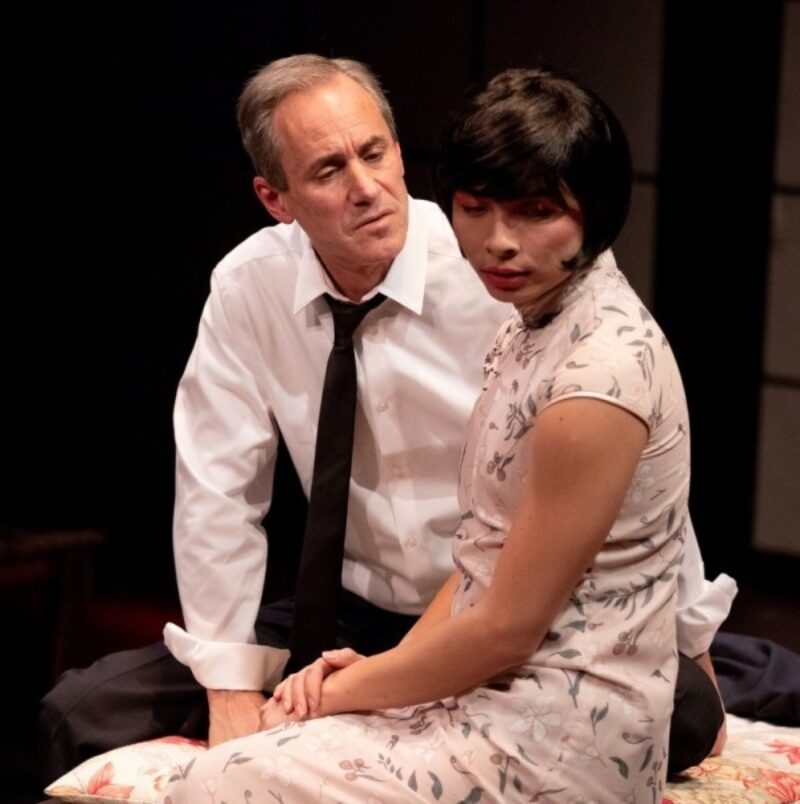The Divide Between ‘Me’ and ‘You’
Written by Teen Editor Hannah Schoettmer, and edited by Teen Editor Lily Williamson!

To an English speaker, the letter ‘M’ is deceitful when placed alone. In our world, we base the assumptions of an unknown person entering a room on their prefix, the “Mr.” or “Ms.”. We shape our expectations of them on it. But, what if the preface is but a single “M.”? If an unknown person entering a room greeted you on paper only as “M.” who would you prepare yourself to see?
So it is in M. Butterfly, written by David Henry Hwang and directed by Samip Raval. We are told the story of Rene Gallimard (David Quicksall), a French diplomat in China and a man enraptured in his own incompetence. In his mind, and as reassured by his colleagues, friends, and wife, there is a meekness about him that robs him of what he may be.
The play is presented as the recollections of a man alone and dejected in a prison cell on the outskirts of Paris. He recounts the grandness that he once saw around himself, and contrasts it with where he sits now. In an interplay of monologuing narration by Gallimard and the recreation of various scenes from his memory, the story of Gallimard and Song Liling (Tom Dang) is told through the eyes of Gallimard, who presents himself as a non-operatic Pinkerton, in line with the duality between the play, M. Butterfly, and the opera, Madame Butterfly.
His world is turned on its head when he meets Song Liling, an actor and dancer of the traditional Chinese fashion. Gallimard first sees her at a party hosted by diplomats, performing the death scene from the opera Madame Butterfly. Enraptured by her presence, Gallimard approaches her after the show and compliments the seeming reality of her enactment, to which Liling takes offense. After informing Gallimard of the West-centric undertones in the so-called ‘beauty’ of the story, Liling invites Gallimard to see her again the next week at her artistic home—a Chinese opera tucked away in the streets. Of course, Gallimard obliges.
One cannot discuss M. Butterfly without addressing the interplay and irony so intrinsic to the plot. Through Gallimard’s eyes, we are shown the dissolution of stereotype and tradition as the other characters, at first passive pawns in his recollection, develop some agency and shape the highlighted details of the story.
This is especially exemplified in Liling’s evolution over the course of the play, from a puppet in Gallimard’s story to a character with agency. This is first evidenced when Liling chooses to highlight her own role outside of acting as Gallimard’s “butterfly,” as a spy and informant for the Chinese Communist party. Although Gallimard openly protests the sharing of this information, Liling insists that it is crucial to their story.
This theme of obfuscation reaches its climax when Liling’s final layer of deceit is revealed. It is shown that, although Liling had led Gallimard to believe that he was a woman, he is instead a male spy who manipulated Gallimard into supplying information to the Communists. This is a subversion of the narrative so familiar in Madame Butterfly, in which the woman kills herself after being abandoned. Gallimard dons the clothing worn in the death scene of Madame Butterfly and enacts his own version of it, in which the death of his self-perception and ego is shown in his transformation, from Gallimard into the Butterfly.
Staged on a single backdrop, with props rotating in and out, M. Butterfly rather exceptionally uses the set to highlight the singular nature of the narration and element of perspective, that is so central to the theme. All of the actors’ performances were exemplary, and although many played multiple roles, each character was distinguished and defined. In the role of Song Liling, Dang particularly highlighted the many conflicting and simultaneous elements of his character, sliding effortlessly between his male and female personas.
Although the opera Madame Butterfly is paralleled in the title of the play, the two pieces couldn’t be more different. One relies on stereotypes, based in both race and gender, and enforces negative idealisms that the Western world holds about the East. In M. Butterfly, however, the dissolution of assumption and the dismemberment of the ugly sort of power that cliché holds shows a wildly different approach to a tale that may initially seem familiar.
The Teen Editorial Staff is made up of 5 teens who curate the review portion of the TeenTix blog and manage the TeenTix Newsroom. More information about the Teen Editorial Staff can be found HERE.
The TeenTix Press Corps promotes critical thinking, communication, and information literacy through criticism and journalism practice for teens. For more information about the Press Corps program see HERE.


